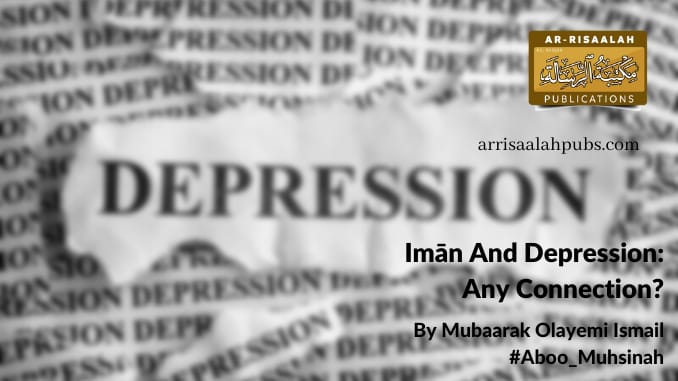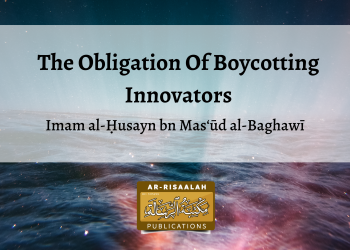Īmān has a lot to do in preventing and curing a person of depression. Īmān gives you the proper orientation about the reality of life and the Aakhirah such that when sadness strikes, you have enough in you to fight it to not lead to depression.
The people who turn away from Īmān will have their living in this world constricted as Allah says,
وَمَنْ أَعْرَضَ عَن ذِكْرِى فَإِنَّ لَهُۥ مَعِيشَةً ضَنكًا
“But whosoever turns away from My Reminder (i.e. neither believes in this Quran nor acts on its orders, etc.) verily, for him is a life of hardship…” ¹
And the people who embrace Īmān totally and enjoy the sweetness of Īmān will be seeing happiness, even if the whole world believes that their affairs are being constricted.
Allah says,
مَنْ عَمِلَ صَـٰلِحًا مِّن ذَكَرٍ أَوْ أُنثَىٰ وَهُوَ مُؤْمِنٌ فَلَنُحْيِيَنَّهُۥ حَيَوٰةً طَيِّبَةً ۖ وَلَنَجْزِيَنَّهُمْ أَجْرَهُم بِأَحْسَنِ مَا كَانُوا۟ يَعْمَلُونَ
“Whoever works righteousness, whether male or female, while he (or she) is a true believer (of Islamic Monotheism) verily, to him We will give a good life (in this world with respect, contentment and lawful provision), and We shall pay them certainly a reward in proportion to the best of what they used to do (i.e. Paradise in the Hereafter)”. ²
Trials were written to happen to every human, however, the people who are not conscious of Allah’s commandments do not have the correct orientation about this. They want everything to be sweet all through and when trials strike, they become shocked and too sad because they weren’t expecting them and they say “God, why me?”, and when the sadness becomes too much, it leads them to depression.
As for the one who has correct Īmān, he understands the words of Allah that say:
أَحَسِبَ ٱلنَّاسُ أَن يُتْرَكُوٓا۟ أَن يَقُولُوٓا۟ ءَامَنَّا وَهُمْ لَا يُفْتَنُونَ
Do people think that they will be left alone because they say: “We believe,” and will not be tested.
وَلَقَدْ فَتَنَّا ٱلَّذِينَ مِن قَبْلِهِمْ ۖ فَلَيَعْلَمَنَّ ٱللَّهُ ٱلَّذِينَ صَدَقُوا۟ وَلَيَعْلَمَنَّ ٱلْكَـٰذِبِينَ
“And We indeed tested those who were before them. And Allah will certainly make (it) known (the truth of) those who are true and will certainly make (it) known (the falsehood of) those who are liars, (although Allah knows all that before putting them to test)”. ³
A believer recognizes that merely saying “I believe in Allah” won’t stop the trial, except that he gets tried by his level of closeness to Allah. This belief will relieve him of the shock of trials and he quickly looks for ways to maintain his Īmān during the trial and how to achieve the best with it.
The proper ‘Aqeedah in Qadar teaches a Muslim that it contains goodness and evil, and that there are things he sees to be evil but they are better for him and there are things he sees to be good, but they are evil to him in reality. This comforts a Muslim with good Īmān and makes him handle his issues better.
The Muslim with the correct concept of Tawakkul recognizes that if the whole world comes together to harm him, they won’t be able to do so except by the permission of Allah, and if they all come together to benefit him, they won’t be able to do so except by the permission of Allah. He knows that no matter what happens, he has to go back to Allah. This will keep him firm in the face of anxiety and depression.
For the Muslim with the correct concept of Zuhd, nothing is more important to him than his connection to Allah and The Home of the Hereafter. This world is already lowly to him and his happiness lies in the sweetness he encounters while prostrating to Allah, this orientation will make him strong in the face of the trials of this world, no matter what worldly materials he loses, he keeps thanking Allah because those materials are already lowly in his eyes. And this is the affairs of people who hold fast to Īmān.
As for people with low or no Īmān, when trials happen to them, they run to things that Allah has made forbidden like associating partners with Allah by calling upon idols, graves, pastors, false sheikh and the likes. Some others run to sins, like shouting and wailing, slapping and cursing themselves, listening to music and watching movies.
Sins ordinarily lead to the unhealthiness of the heart and Shirk is the biggest means to make the heart constricted. These sins are instruments of Shaytān and what Shaytān wants is to cause you grief and make you sad. Allah says,
إِنَّمَا ٱلنَّجْوَىٰ مِنَ ٱلشَّيْطَـٰنِ لِيَحْزُنَ ٱلَّذِينَ ءَامَنُوا۟
“Secret counsels (conspiracies) are only from Shaitan, so that he may cause grief to the believers.”⁴
How does a person seek pacification from the one whose primary aim is to make him sad?
A man may feel at ease at the time he’s listening to music, but the temporary easiness is a bait to make him listen to more and more, and in the end, he finds out that he has increased in nothing except more depression. People who seek pacification in watching films and reading dark poems and memes – written by depressed people who have no life or religious guidance – find in them ways to misguide themselves to start romancing their ailments; loving to be the glorified “Psycho” in Korean soap operas, believing that this world is negative and they want to be pessimistic all through or even believe that the world is cruel and some end their lives by committing suicide.
But people who hold fast to Īmān and the correct ‘Aqeedah recognize patience and its virtues and they become patient. They recognize relying upon Allah and its virtues, and they rely upon Allah. They recognize the virtues of dūa and their correct Aqeedah teaches them that Allah descends at the last third part of the night to answer prayers, and that makes them call upon Allah. And by this, they see the way out quickly unlike others.
A person who is conscious of Allah and holds fast to the remembrance of Allah, his heart will find rest. Allah says,
ٱلَّذِينَ ءَامَنُوا۟ وَتَطْمَئِنُّ قُلُوبُهُم بِذِكْرِ ٱللَّهِ ۗ أَلَا بِذِكْرِ ٱللَّهِ تَطْمَئِنُّ ٱلْقُلُوبُ
“Those who believe (in the Oneness of Allah – Islamic Monotheism), and whose hearts find rest in the remembrance of Allah, Verily, in the remembrance of Allah do hearts find rest.”⁵
Remembering Allah has a lot to do with curing depression, apart from the healing that comes from Allah due to remembering him, each act of remembrance has an effect in curing depression. Reciting the Qurān is a form of remembering Allah and Allah cures illnesses of the heart by it as Allah says,
يَـٰٓأَيُّهَا ٱلنَّاسُ قَدْ جَآءَتْكُم مَّوْعِظَةٌ مِّن رَّبِّكُمْ وَشِفَآءٌ لِّمَا فِى ٱلصُّدُورِ وَهُدًى وَرَحْمَةٌ لِّلْمُؤْمِنِينَ
“O mankind! There has come to you a piece of good advice from your Lord (i.e. the Quran, ordering all that is good and forbidding all that is evil), and a healing for that (disease of ignorance, doubt, hypocrisy and differences, etc.) in your breasts, – guidance and mercy (explaining lawful and unlawful things, etc.) for the believers”.⁶
And when a man recites the Qurān often and reflects upon its verses, he will see Allah’s blessings, see several reasons to thank Allah, worship Him and get closer to Him. He sees those before us, who are even more closer to Allah get tested and this helps him to get out of his Sadness.
Saying the Adhkaar is part of Remembering Allah, praying against sadness, worry, anxiety and depression is part of Adhkar. As it was reported in Sahīh Bukhari from the Hadith of Anas bn Maalik, that the prophet ﷺ would say
اللَّهُمَّ إِنِّي أَعُوذُ بِكَ مِنَ الْهَمِّ وَالْحَزَنِ، وَالْعَجْزِ وَالْكَسَلِ، وَالْجُبْنِ وَالْبُخْلِ، وَضَلَعِ الدَّيْنِ، وَغَلَبَةِ الرِّجَالِ ”.
“O Allah! I seek refuge with You from worry and grief, from incapacity and laziness, from cowardice and miserliness, from being heavily in debt and from being overpowered by (other) men.”
And also from remembering Allah is seeking beneficial knowledge and sitting in the circles of knowledge.
وعن أبي هريرة رضي الله عنه قال: قال رسول الله صلى الله عليه وسلم: “ما اجتمع قوم في بيت من بيوت الله يتلون كتاب الله، ويتدارسونه بينهم، إلا نزلت عليهم السكينة، وغشيتهم الرحمة، وحفتهم الملائكة، وذكرهم الله فيمن عنده” ((رواه مسلم)).
Abu Hurayrah (May Allah be pleased with him) reported:
The Messenger of Allah ﷺ said,
“Any group of people that assemble in one of the Houses of Allah to recite the Book of Allah, learning and teaching it, tranquillity will descend upon them, mercy will engulf them, angels will surround them and Allah will make mention of them to those (the angels) with Him.”⁷
The tranquillity that will descend into the heart of the one sitting in the gathering of knowledge will help him with his heart, and the sweetness and happiness connected to doing good deeds and achieving his aims of reading and memorizing books and texts will also help him. When he gets constant happiness and sweetness from his constant sitting in the gatherings of knowledge, the happiness and sweetness fill his heart and his sadness and depression disappears.
These are just a few I can remember regarding the connection between Imān and Depression, to know more about this topic, sit with scholars and read their books. I especially recommend the books of Ibnul Qayyim for this, Ad Daau wad Dawaa and the likes of it.
We ask Allah to ease our affairs.
Mubaarak Olayemi Ismail
Abu Muhsinah
1. Taha:124
2. Nahl:97
3. Ankabut:2,3
4. Mujaadilah:10.
5. Ra’d:28
6. Yunus:57
7. Muslim









What an Inspiring piece! May Almighty Allah grant your more knowledge (Ameen)
Aameen
BaarakaLlahu feekum.
Aameen
JazākumuLlahu Khayran!
Wa antum
This is awesome 👍👍👍